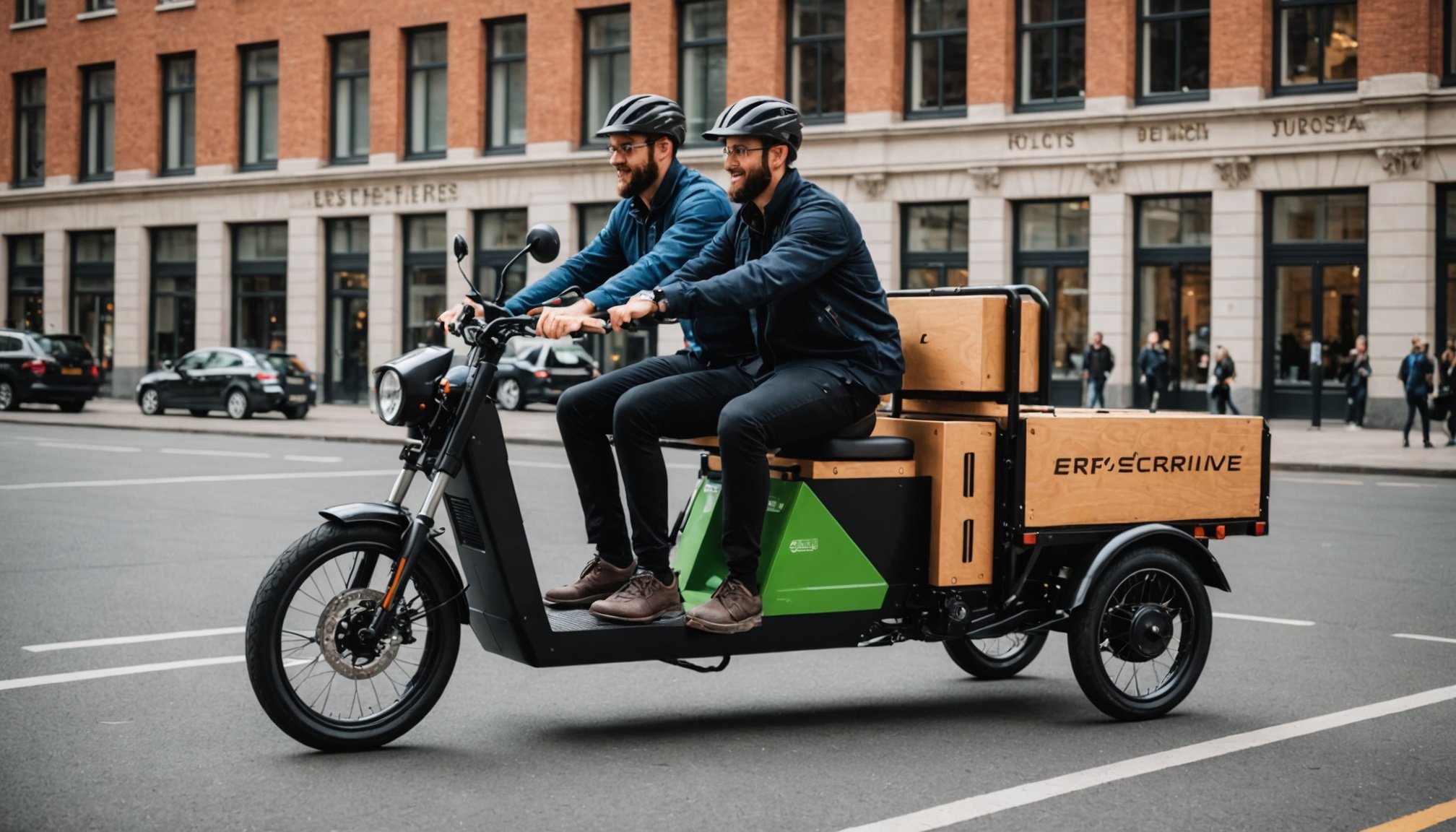Overview of Electric Cargo Bikes
Electric Cargo Bikes are transforming the landscape of sustainable delivery solutions. These bikes are essentially two- or three-wheeled pedal-electric vehicles designed to transport goods efficiently. Equipped with an electric motor, they can carry considerable loads and cover longer distances with ease. Companies increasingly see these as viable alternatives to traditional delivery methods, primarily due to their eco-friendly nature and cost-effectiveness.
Compared to conventional delivery vans or trucks, Electric Cargo Bikes are more agile, capable of navigating congested city streets effortlessly. They reduce carbon footprints, contributing positively to urban environments by alleviating traffic congestion and minimizing greenhouse gas emissions.
In parallel : AI in Action: Transforming the UK Energy Market with Predictive Analytics
Recent years have witnessed significant growth in the electric cargo bike market. This surge is fueled by an increasing demand for sustainable logistics solutions and the encouragement from government incentives aiming to reduce urban pollution. Interestingly, trends show a diversification in use cases, with businesses in sectors ranging from food delivery to parcel services adopting these bikes.
The adaptability and benefits of Electric Cargo Bikes position them as a forward-thinking choice for modern delivery systems. As sustainability becomes an enterprise priority, their market presence and influence will undoubtedly continue to expand.
Also to read : Harnessing AI Magic: Revolutionizing UK Retail with Tailored Marketing Strategies for Unprecedented Success
Environmental Benefits of Electric Cargo Bikes
The environmental impact of electric cargo bikes is a driving force behind their adoption. By significantly reducing greenhouse gas emissions, these bikes offer a cleaner alternative to traditional delivery vehicles. In urban settings plagued by rising pollution levels, electric cargo bikes are a breath of fresh air. Their capability to operate with low emissions aligns with the growing demand for sustainability and green logistics.
Additionally, electric cargo bikes help decrease traffic congestion, particularly in densely populated areas. Unlike conventional delivery vans, these nimble bikes can weave through crowded streets, ensuring timely and efficient deliveries. This reduces not only delivery times but also contributes to a free-flowing traffic environment.
Perhaps one of the most compelling benefits is the efficient use of space. Electric cargo bikes require far less parking and maneuvering space than traditional vehicles. This makes them an ideal choice for urban environments, where every square foot is valuable. By efficiently using space and resources, they minimize the urban carbon footprint.
In conclusion, as cities strive to adopt greener initiatives, the environmental benefits of electric cargo bikes position them as a progressive choice in the drive towards sustainable urban mobility.
Innovations Influencing Urban Delivery
As urban landscapes evolve, delivery innovations are crucial in revolutionising logistics. One such advancement is the integration of smart city initiatives with electric cargo bikes. These initiatives enable better data sharing, optimising route planning and increasing the overall efficiency of deliveries. The collaboration between municipalities and tech industries results in smarter, more responsive urban environments.
Integration with Smart City Initiatives
Electric cargo bikes align well with smart city goals. Their incorporation into advanced urban systems leads to more efficient cargo transport, which benefits residents and city infrastructure. Route optimisation and traffic management become streamlined, making deliveries faster and less prone to delays. The intelligent use of data aids these bikes in navigating urban congestion.
Role of IoT in Fleet Management
Technology integration through Internet of Things (IoT) in fleet management further enhances the capabilities of electric cargo bikes. IoT devices provide real-time data and diagnostics, allowing for precise tracking and maintenance scheduling. Anticipating issues before they occur ensures swift service, minimising downtime, and enhancing fleet reliability.
Advancements in Battery Technology
Recent advancements in battery technology are pivotal for electric cargo bike performance. Enhanced batteries boost both range and load capacity. Reliable and widespread charging infrastructure supports these bikes’ increased mobility, ensuring that they remain a sustainable delivery solution in the urban ecosystem.
Real-World Case Studies of Electric Cargo Bike Implementations
Success stories of electric cargo bikes are abundant in today’s urban delivery landscape, showcasing their effectiveness in real-world applications. For instance, UPS has integrated electric cargo bikes within their delivery fleet in European cities, significantly enhancing delivery efficiency and sustainability. These bikes have reduced delivery times due to their ability to navigate congested urban areas more effectively than traditional vans.
Another compelling case is the implementation by DHL. They have successfully lowered operational costs while maintaining customer satisfaction by adopting electric cargo bikes for last-mile deliveries. These bikes carry substantial loads, minimizing the need for multiple trips and thus conserving resources.
Businesses using electric cargo bikes report notable improvements in delivery speed and reduction in emissions, contributing positively to their environmental impact goals. However, challenges such as weather conditions and load limits occasionally arise, requiring creative logistics solutions.
Lessons learned highlight the importance of selecting the right bike type suited to specific business needs, understanding urban zoning laws, and investing in proper staff training. These case studies affirm that electric cargo bikes are not just a sustainable choice but also a profitable business strategy.
Practical Tips for Businesses Considering Electric Cargo Bikes
For businesses eager to embrace electric cargo bikes as part of their sustainable delivery solutions, addressing several key aspects can ensure a smooth transition and successful integration. Initially, selecting the appropriate cargo bike model is crucial. Businesses must evaluate factors like load capacity, range, and durability, tailored to their unique logistical needs. Different businesses might benefit from models with varying features, emphasizing the importance of understanding specific delivery requirements.
Staff training is essential to maximize efficiency and maintain the fleet’s longevity. Implementing comprehensive training programs focusing on bike operation, loading techniques, and basic maintenance empowers employees to handle these vehicles effectively. In addition, regular maintenance routines extend vehicle lifespan and prevent costly breakdowns, backing up sustainability with practical reliability.
Transitioning to electric cargo bikes should also involve a strategic integration plan. Businesses can experiment with pilot programs, allowing for adjustments before full-scale deployment. Thoroughly assessing urban delivery routes and optimizing them ensures efficient use of the bikes’ capabilities. Collaborations with municipal authorities might offer insights into urban infrastructure and incentives, paving the way for more seamless delivery operations.
Ultimately, taking a well-rounded approach guarantees successful adoption of electric cargo bikes, aligning business objectives with environmental and logistical advancements.
Future Trends in Electric Cargo Bike Delivery
Electric cargo bikes are poised for transformative growth in urban transportation trends. With advancements in technology and increasing eco-consciousness, the market outlook predicts a considerable expansion over the next decade. The integration of autonomous features and enhancements in battery technology will further boost this trend, making these bikes even more efficient and user-friendly.
The impact of policy changes cannot be understated, as governments worldwide are implementing regulations to curb urban emissions. These policies often come alongside incentives for companies adopting sustainable delivery methods, thus propelling the adoption rate of electric cargo bikes. Cities are actively investing in infrastructure supportive of these bikes, like dedicated lanes and parking spots, enhancing their urban viability.
The potential for collaborations between businesses and municipalities is enormous. As cities evolve, working together could lead to innovative models of shared logistics networks, easing delivery operations and reducing individual costs. Businesses aiming to contribute to sustainability goals while meeting growing urban delivery demands will likely turn to these partnerships.
In essence, as technology integration becomes seamless and urban transportation trends shift, electric cargo bikes are set to become a cornerstone of efficient, eco-friendly logistics systems.











